 November 4, 2008 - Children and adult members who live with adult smokers are more likely to be underfed and undernourished, a new study finds. "We know that there are long-term consequences of food insecurity for children. They are more likely to do poorly in school, to have iron deficiency and anemia, and to have behavioral and social problems," said study author Dr. Michael Weitzman, chairman of pediatrics at New York University School of Medicine.
November 4, 2008 - Children and adult members who live with adult smokers are more likely to be underfed and undernourished, a new study finds. "We know that there are long-term consequences of food insecurity for children. They are more likely to do poorly in school, to have iron deficiency and anemia, and to have behavioral and social problems," said study author Dr. Michael Weitzman, chairman of pediatrics at New York University School of Medicine.
Study: Increased Rates and Severity of Child and Adult Food Insecurity in Households With Adult Smokers; Cynthia Cutler-Triggs, MD George E. Fryer, PhD; Thomas J. Miyoshi, MSW; Michael Weitzman, MD; Arch Pediatr Adolesc Med. 2008;162(11):1056-1062; ABSTRACT..
Looking at data on 8,817 households gathered in national surveys by the U.S. Centers for Disease Control and Prevention, it was found that 15 percent of adults and 11 percent of children reported food insecurity within the past year, with 6 percent of adults and 1 percent of children experiencing severe food insecurity. This meant they went to bed hungry, because there wasn't enough food in the house. [Food insecurity - "it is a standardized scale measuring how many times a household cannot give children the food they want, how many meals they skip, how often they go to bed hungry," Weitzman said.]
The study found that 23 percent of households with children had at least one smoker, with the incidence higher -- 32 percent -- in low-income households. In those households with a smoker, 17 percent of children were food insecure, compared to 8.7 percent of those children in nonsmoking households. Severe food insecurity was reported for 3.2 percent of children in smoking households, compared to 0.9 percent of those living in households with no smokers. Because families with at least one smoker spend an estimated 2 percent to 20 percent of their income on tobacco, it's quite likely that smokers' habits drain the money needed to provide adequate food, according to background information with the study.
Reference: Smokers'Homes More Likely to House Hungry Kids by Ed Edelson, HealthDay Reporter, 11/4/2008.
Bringing the World of Tobacco Control closer together..
Smokers' Homes More Likely to House Hungry Kids..
Subscribe to:
Post Comments (Atom)


To Provide Public Awareness
Purpose
About Us
Contact Us
2008 HIGHLIGHTS
TOPIX PAPERS - 2008 & 2009..
Archive
-
▼
2008 (578)
-
▼
11/02 - 11/09 (11)
- Revise Senate's Version FDA Tobacco Regulation Bill..
- Federal Judge Denies Bid To Stop San Francisco Pha...
- FDA tobacco regulation - bill distorted in current...
- SCHIP expansion legislation time to try again..
- Malaysia to hike cigarette prices ..
- STOP launch of PM's Virginia Slim "Super Slim" cig...
- Republic Technologies to acquire Swedish Match UK..
- Smokers' Homes More Likely to House Hungry Kids..
- C-store update: Marlboro, Pall Mall, Camel SNUS..
- 50 lashes for smoker on Saudia Arabian Airlines..
- Surabaya, Indonesia - anti-smoking bylaw 10/2009 -...
-
▼
11/02 - 11/09 (11)
© Copyright Notice: The content of this website is for information education purposes only and any newsbrief may be used only as "fair use" for information/education purposes with permission of the authors and providing that original references and associated reference links are included in HTML format.
0 comments:
Post a Comment